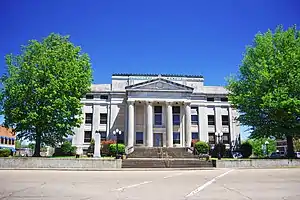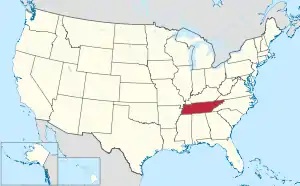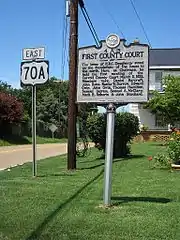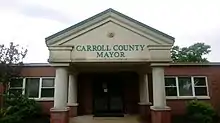Carroll County, Tennessee
Carroll County is a county located in the western division of the U.S. state of Tennessee. As of the 2020 census, the population was 28,440.[2] Its county seat is Huntingdon.[3] The county was established by the Tennessee General Assembly on November 7, 1821,[4] and was named for Governor William Carroll.[5]
Carroll County | |
|---|---|
 Carroll County Courthouse in Huntingdon | |
 Location within the U.S. state of Tennessee | |
 Tennessee's location within the U.S. | |
| Coordinates: 35°59′N 88°27′W | |
| Country | |
| State | |
| Founded | November 7, 1821 |
| Named for | William Carroll[1] |
| Seat | Huntingdon |
| Largest city | McKenzie |
| Area | |
| • Total | 600 sq mi (2,000 km2) |
| • Land | 599 sq mi (1,550 km2) |
| • Water | 0.8 sq mi (2 km2) 0.1% |
| Population (2020) | |
| • Total | 28,440 |
| • Density | 48/sq mi (19/km2) |
| Time zone | UTC−6 (Central) |
| • Summer (DST) | UTC−5 (CDT) |
| Congressional district | 8th |
| Website | carrollcountytn |
Geography
According to the U.S. Census Bureau, the county has a total area of 600 square miles (1,600 km2), of which 599 square miles (1,550 km2) is land and 0.8 square miles (2.1 km2) (0.1%) is water.[6]
Carroll County Thousand Acre Recreational Lake
The Carroll County Thousand Acre Recreational Lake serves as a large water territory in Carroll County, Tennessee. Many locals have called the lake their home for years.
In 2022, the county attempted to change the name, but after citizens of the county petitioning to keep the original name, they kept the Carrol County Thousand Acre Recreational Lake name the same.
Adjacent counties
- Henry County (northeast)
- Benton County (east)
- Decatur County (southeast)
- Henderson County (south)
- Madison County (southwest)
- Gibson County (west)
- Weakley County (northwest)
State protected areas
- Harts Mill Wetland Wildlife Management Area (part)
- Jarrell Switch Refuge
- Natchez Trace State Forest (part)
- Natchez Trace State Park (part)
Demographics
| Census | Pop. | Note | %± |
|---|---|---|---|
| 1830 | 9,397 | — | |
| 1840 | 12,362 | 31.6% | |
| 1850 | 15,967 | 29.2% | |
| 1860 | 17,437 | 9.2% | |
| 1870 | 19,447 | 11.5% | |
| 1880 | 22,103 | 13.7% | |
| 1890 | 23,630 | 6.9% | |
| 1900 | 24,250 | 2.6% | |
| 1910 | 23,971 | −1.2% | |
| 1920 | 24,361 | 1.6% | |
| 1930 | 26,132 | 7.3% | |
| 1940 | 25,978 | −0.6% | |
| 1950 | 26,553 | 2.2% | |
| 1960 | 23,476 | −11.6% | |
| 1970 | 25,741 | 9.6% | |
| 1980 | 28,285 | 9.9% | |
| 1990 | 27,514 | −2.7% | |
| 2000 | 29,475 | 7.1% | |
| 2010 | 28,522 | −3.2% | |
| 2020 | 28,440 | −0.3% | |
| U.S. Decennial Census[7] 1790-1960[8] 1900-1990[9] 1990-2000[10] 2010-2014[11] | |||

2020 census
| Race | Num. | Perc. |
|---|---|---|
| White (non-Hispanic) | 23,744 | 83.49% |
| Black or African American (non-Hispanic) | 2,445 | 8.6% |
| Native American | 75 | 0.26% |
| Asian | 124 | 0.44% |
| Pacific Islander | 5 | 0.02% |
| Other/Mixed | 1,278 | 4.49% |
| Hispanic or Latino | 769 | 2.7% |
As of the 2020 United States census, there were 28,440 people, 10,962 households, and 7,451 families residing in the county.
2000 census
As of the census[14] of 2000, there were 29,475 people, 11,779 households, and 8,398 families residing in the county. The population density was 49 people per square mile (19 people/km2). There were 13,057 housing units at an average density of 22 units per square mile (8.5/km2). The racial makeup of the county was 87.68% White, 10.35% Black or African American, 0.24% Native American, 0.16% Asian, 0.02% Pacific Islander, 0.45% from other races, and 1.10% from two or more races. 1.41% of the population were Hispanic or Latino of any race.
There were 11,779 households, out of which 30.00% had children under the age of 18 living with them, 56.30% were married couples living together, 11.50% had a female householder with no husband present, and 28.70% were non-families. 25.80% of all households were made up of individuals, and 12.70% had someone living alone who was 65 years of age or older. The average household size was 2.42 and the average family size was 2.90.
In the county, the population was spread out, with 23.20% under the age of 18, 8.40% from 18 to 24, 26.70% from 25 to 44, 24.40% from 45 to 64, and 17.30% who were 65 years of age or older. The median age was 39 years. For every 100 females there were 92.30 males. For every 100 females age 18 and over, there were 89.80 males.
The median income for a household in the county was $30,463, and the median income for a family was $36,880. Males had a median income of $29,904 versus $20,024 for females. The per capita income for the county was $16,251. About 10.90% of families and 13.90% of the population were below the poverty line, including 17.90% of those under age 18 and 13.40% of those age 65 or over.
Transportation
The Carroll County Airport is a county-owned public-use airport located four nautical miles (4.6 mi; 7.4 km) northwest of the central business district of Huntingdon, Tennessee.[15]
Media
Radio stations
- WRQR-FM 105.5 "Today's Best Music with Ace & TJ in the Morning"
- WTPR-AM 710 "The Greatest Hits of All Time"
- WTPR-FM 101.7 "The Greatest Hits of All Time"
- WEIO "100.9 The Farm"
- WHDM 1440-AM 98.9-FM
- WAJJ 89.3 FM Christian Radio "The J"
Newspapers
- The McKenzie Banner
- Carroll County News-Leader
- Tennessee Magnet Publications
Communities

City
- McKenzie (small portions in Henry County and Weakley County)
Towns
- Atwood
- Bruceton
- Clarksburg
- Hollow Rock
- Huntingdon (county seat)
- McLemoresville
- Trezevant
Unincorporated Communities
Politics

In the 21st century, Carroll County is overwhelmingly Republican. In general, the alignment of voters with the two major parties has shifted since the late 20th century, but Carroll County had a different history. Conservative whites in the upland and Deep South largely shifted away from the Democratic Party in the late 20th century to the Republican Party, but Carroll County had only briefly supported Democratic presidential candidates in the 20th century: 1912, when Southerner Woodrow Wilson was elected; from 1932 to 1948, for Franklin D. Roosevelt and Harry Truman during the Depression and years of World War II and after, and Southerners Lyndon B. Johnson in 1964, Jimmy Carter in 1976, and Bill Clinton in 1992–1996.[16]
But at the time of the American Civil War and for decades after, Carroll was the northernmost county in the Unionist Republican bloc, made up of Wayne, Henderson, Hardin and McNairy counties, within historically Democratic West Tennessee. The whites in this bloc were yeomen farmers who owned few slaves; most identified as Unionist. In Tennessee's Ordinance of Secession referendum on June 8, 1861, Carroll County voted to remain in the Union by a margin of 1,349 to 967,[17] whilst earlier on February 9, 1861, county voters voted against holding a secession convention by a margin of 1,495 to 678.[18] Historians note that the enclave developed this way because, unlike in the fertile Delta, this region of the Highland Rim had soils that were shallow, humus-poor and easily erodible. Settlers who were poor could acquire land here, as the area could not support the plantations more typical of Middle and West Tennessee, which were dependent on the labor of enslaved African Americans.[19]
| Year | Republican | Democratic | Third party | |||
|---|---|---|---|---|---|---|
| No. | % | No. | % | No. | % | |
| 2020 | 9,205 | 77.32% | 2,559 | 21.50% | 141 | 1.18% |
| 2016 | 7,756 | 74.69% | 2,327 | 22.41% | 301 | 2.90% |
| 2012 | 7,225 | 66.58% | 3,475 | 32.02% | 151 | 1.39% |
| 2008 | 7,455 | 64.01% | 3,980 | 34.17% | 211 | 1.81% |
| 2004 | 6,605 | 56.18% | 5,070 | 43.12% | 82 | 0.70% |
| 2000 | 5,465 | 50.48% | 5,239 | 48.39% | 123 | 1.14% |
| 1996 | 4,206 | 42.70% | 4,912 | 49.87% | 731 | 7.42% |
| 1992 | 4,842 | 41.04% | 5,741 | 48.66% | 1,216 | 10.31% |
| 1988 | 5,635 | 57.32% | 4,151 | 42.23% | 44 | 0.45% |
| 1984 | 6,017 | 56.43% | 4,568 | 42.84% | 77 | 0.72% |
| 1980 | 5,681 | 50.98% | 5,277 | 47.36% | 185 | 1.66% |
| 1976 | 4,031 | 41.47% | 5,581 | 57.41% | 109 | 1.12% |
| 1972 | 5,784 | 69.28% | 2,290 | 27.43% | 275 | 3.29% |
| 1968 | 3,757 | 41.80% | 1,932 | 21.50% | 3,298 | 36.70% |
| 1964 | 3,734 | 47.93% | 4,056 | 52.07% | 0 | 0.00% |
| 1960 | 4,517 | 59.36% | 2,961 | 38.91% | 131 | 1.72% |
| 1956 | 4,235 | 55.80% | 3,232 | 42.58% | 123 | 1.62% |
| 1952 | 3,741 | 56.46% | 2,841 | 42.88% | 44 | 0.66% |
| 1948 | 2,651 | 42.95% | 2,818 | 45.65% | 704 | 11.40% |
| 1944 | 2,996 | 58.88% | 2,077 | 40.82% | 15 | 0.29% |
| 1940 | 2,782 | 49.31% | 2,830 | 50.16% | 30 | 0.53% |
| 1936 | 2,282 | 42.87% | 2,989 | 56.15% | 52 | 0.98% |
| 1932 | 2,505 | 48.58% | 2,603 | 50.48% | 48 | 0.93% |
| 1928 | 2,981 | 62.80% | 1,743 | 36.72% | 23 | 0.48% |
| 1924 | 2,199 | 51.61% | 1,962 | 46.05% | 100 | 2.35% |
| 1920 | 4,141 | 56.29% | 3,215 | 43.71% | 0 | 0.00% |
| 1916 | 2,217 | 52.05% | 2,001 | 46.98% | 41 | 0.96% |
| 1912 | 1,362 | 33.62% | 1,653 | 40.80% | 1,036 | 25.57% |
References
- Joe David McClure, "Carroll County," Tennessee Encyclopedia of History and Culture. Retrieved: 22 June 2013.
- "Census - Geography Profile: Carroll County, Tennessee". United States Census Bureau. Retrieved December 31, 2022.
- "Find a County". National Association of Counties. Archived from the original on May 31, 2011. Retrieved June 7, 2011.
- "TN Public Acts of 1821 Chapter 32". CTAS Private Acts. Retrieved February 16, 2017.
- Gannett, Henry (1905). The Origin of Certain Place Names in the United States. Govt. Print. Off. pp. 70.
- "2010 Census Gazetteer Files". United States Census Bureau. August 22, 2012. Retrieved April 2, 2015.
- "U.S. Decennial Census". United States Census Bureau. Retrieved April 2, 2015.
- "Historical Census Browser". University of Virginia Library. Retrieved April 2, 2015.
- Forstall, Richard L., ed. (March 27, 1995). "Population of Counties by Decennial Census: 1900 to 1990". United States Census Bureau. Retrieved April 2, 2015.
- "Census 2000 PHC-T-4. Ranking Tables for Counties: 1990 and 2000" (PDF). United States Census Bureau. April 2, 2001. Archived (PDF) from the original on October 9, 2022. Retrieved April 2, 2015.
- "State & County QuickFacts". United States Census Bureau. Archived from the original on July 14, 2011. Retrieved November 29, 2013.
- Based on 2000 census data
- "Explore Census Data". data.census.gov. Retrieved December 8, 2021.
- "U.S. Census website". United States Census Bureau. Retrieved May 14, 2011.
- FAA Airport Form 5010 for HZD PDF. Federal Aviation Administration. Effective 30 June 2011.
- Leip, David. "Dave Leip's Atlas of U.S. Presidential Elections". uselectionatlas.org. Retrieved March 10, 2018.
- "Tennessee Secession Referendum, 1861". Vote Archive.
- "Tennessee Vote on Secession Convention, 1861". Fayetteville Observer. March 21, 1861.
- Wright, John K. (October 1932). "Voting Habits in the United States: A Note on Two Maps". Geographical Review. 22 (4): 666–672.
Further reading
- History of Carroll County Tennessee. Nashville: Turner Publishing (1987). ISBN 0-938021-01-X
External links
- Carroll County Chamber of Commerce
- Carroll County, TNGenWeb - free genealogy resources for the county
- Carroll County at Curlie